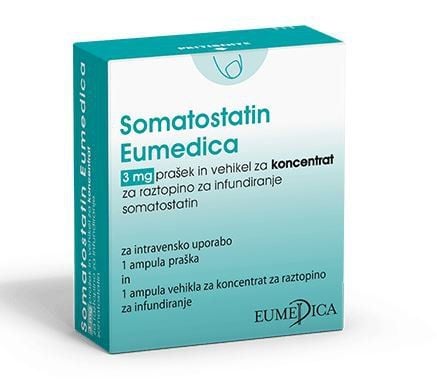This is an automatically translated article.
Ampanto drug is used by injection or intravenous infusion to treat diseases of the gastrointestinal tract such as peptic ulcer, Zollinger-Ellison syndrome, gastroesophageal reflux disease, ... To ensure To be safe and effective soon with Ampanto treatment, you need to closely follow your doctor's instructions for a reasonable dosing plan.
1. What is Ampanto?
What is Ampanto drug? Ampanto belongs to the group of gastrointestinal drugs, originating from India and currently widely circulated in Vietnam. Ampanto drug is highly appreciated by experts for its ability to effectively treat gastrointestinal diseases such as peptic ulcer or gastroesophageal reflux disease.
Ampanto is prepared in the form of lyophilized powder for injection with the main ingredient is Pantoprazole sodium 40mg. Each box of Ampanto includes 1 vial with 1 vial of 10ml solvent.
2. What are the effects of Ampanto?
2.1 Uses of the active ingredient Pantoprazole Pantoprazole is known as a specific proton pump inhibitor, which has a selective effect on the gastric cell wall, thereby bringing about more effective and rapid effects than other drugs. . According to research, after only 8 weeks of treatment, the patient's ulcer healing rate can reach 95%. On the other hand, Pantoprazole rarely affects gastric juice volume, gastric contractility, gastric endothelial factor and Pepsin secretion.Below are the pharmacokinetics of the active ingredient Pantoprazole in Ampanto:
Absorption: After loading into the body, Pantoprazole is rapidly absorbed from the gastrointestinal tract, but may vary depending on the dose. as well as gastric pH. The oral bioavailability of Pantoprazole can be up to 70% in the case of repeated dosing. Distribution: Pantoprazole is strongly bound to plasma proteins. Metabolism: Pantoprazole is metabolized mainly in the liver. Elimination: Approximately 80% of a dose of Pantoprazole is eliminated by the kidneys with a half-life of 30 to 90 minutes. 2.2 Indications and contraindications for using Ampanto Currently, Ampanto is used as prescribed by doctors to effectively treat the following gastrointestinal problems:
Peptic ulcer disease. Prophylaxis of the risk of gastric and duodenal ulcers caused by the use of non-steroidal anti-inflammatory drugs. Gastroesophageal reflux . Treatment of pathological hyperacidity in patients with Zollinger-Ellison syndrome. Use combination of Ampanto drug with other antibiotics to destroy Hp bacteria that cause peptic ulcers. However, it is necessary to avoid arbitrarily using Ampanto for the following patients without a doctor's prescription:
Patients with hypersensitivity or allergic reactions to the active ingredient Pantoprazole or any excipients Auxiliaries are added to the drug formulation. Patients with a history of hypersensitivity to other Benzimidazole derivatives such as Lansoprazole, Esomeprazole, Rabeprazole or Omeprazole. Relative contraindications to the use of Ampanto for pregnant women, suspected pregnant women or nursing mothers.
3. Dosage and how to use Ampanto effectively
3.1 The recommended dosage of Ampanto drug Dosage of Ampanto drug will be determined based on the health status of each patient:
Treatment of peptic ulcer or severe gastroesophageal reflux : Dose 40mg / time / day in the morning for 4 - 8 weeks. The course of treatment can be extended up to 16 weeks if the patient has an esophageal ulcer that does not heal after 8 weeks of therapy. The maintenance dose of Ampanto is 20-40mg/day. Treatment of benign peptic ulcer disease: 40mg / day and treatment for 4 - 8 weeks. Treatment of gastric and duodenal ulcers caused by Hp bacteria: Combined with other birth regimens with a dose of Ampanto 40mg x 2 times/day. Prophylaxis of peptic ulcers caused by NSAIDs: 20mg/day. Treatment of pathological acidosis in people with Zollinger-Ellison syndrome: Use an initial dose of 80mg/day, then adjust the dose according to the patient's response. Patients with renal impairment: No dose adjustment of Ampanto is required. Patients with severe hepatic impairment: It is necessary to reduce the dose of Ampanto or take it every other day. The maximum dose of Ampanto is 20mg/day or 40mg/time/2 days. 3.2 Instructions on how to use Ampanto drug Ampanto is prepared in the form of lyophilized powder for intravenous injection or intravenous infusion (depending on the doctor's instructions). Here is how to prepare Ampanto for each specific route of administration:
Intravenous route: Mix 1 vial of lyophilized powder for injection 40mg with about 10ml of 0.9% NaCl solution, then inject slowly intravenously within at least 2 minutes. Intravenous infusion: Mix 1 vial of lyophilized powder for injection with content of 40mg with 5% dextran, about 100ml of 0.9% NaCl solution or Ringer Lactate solution. After reconstitution, intravenous infusion to the patient within 15 minutes. Ampanto drug solution after reconstituted should not be mixed or shared infusion set with other drugs. In addition, the drug solution should also be used up to 12 hours after reconstitution to ensure microbiological quality. If only 20mg of Ampanto is needed, only about half the volume of the injection phase is used, and any unused solution is discarded.
During injection or intravenous infusion with Ampanto, patients need to carefully monitor the body's reactions and follow all instructions of the doctor to ensure safety. Patients should avoid self-administering, adjusting the dose or using other drugs without specifically discussing with the doctor.
4. Possible side effects when taking Ampanto
Patients should immediately tell their doctor or go to the nearest medical facility if they have any symptoms of an allergy to Ampanto medicine such as swelling of the tongue, swelling of the throat, swelling of the lips, rash, swelling of the face, difficulty breathing or anaphylaxis. In addition, you also need to stop using Ampanto if you experience signs of magnesium deficiency, including:
Feeling restless. Muscle twitch. Heart beats fast. Irregular heartbeat. Bloody or watery bowel movements. Muscle weakness, cramps or a feeling of weakness in the limbs. Choking or coughing. Difficulty concentrating, headache, memory problems Loss of appetite, weakness, confusion, feeling unsteady. Convulsions, hallucinations, fainting, or shallow breathing. Under certain circumstances, you may also experience some of the more common and transient side effects of Ampanto treatment such as:
Nausea, vomiting, stomach pain or mild diarrhea. Change weight. Stomach pain. Belching . Dizzy. Sleepy. Athritis. Insomnia or trouble sleeping. Feeling tired. Not all patients experienced these adverse reactions while taking Ampanto. Other rare side effects not mentioned are also possible during treatment. If you have any concerns about the side effects of Ampanto, talk to your healthcare provider specifically.
5. Some notes and cautions in the process of taking Ampanto
In order to ensure safety and soon achieve effective treatment when using Ampanto, patients should note the following:
Before taking Ampanto or any other proton pump inhibitor, it should be excluded. the patient's potential for stomach cancer, because this drug can mask symptoms and cause a late diagnosis of cancer. Use caution when using Ampanto for people with cirrhosis, liver failure or severe liver disease. If it is necessary to use Ampanto, the patient should monitor liver function regularly. Use caution when administering Ampanto to patients with elderly or impaired renal function. There are no specific studies on the use and safety of Ampanto for pregnant women and nursing mothers. Therefore, only use Ampanto for these subjects when absolutely necessary and the benefits must outweigh the risks. Do not use Ampanto while driving or operating machinery because the drug can cause side effects such as dizziness, drowsiness, ... It is necessary to consult a doctor before deciding to use Ampanto at the same time with other drugs such as antibiotics (Ledipasvir, Atazanavir, Nelfinavir,...), anti-cancer drugs (Dabrafenib, Bosutinib, Methotrexate,...) or drugs to treat depression (Eslicarbazepine Acetate, Citalopram, .. .). Check the expiration date and quality of the medicine before using it to avoid expired or damaged injections. Ampanto drug is used by injection or intravenous infusion to treat diseases of the gastrointestinal tract such as peptic ulcer, Zollinger-Ellison syndrome, gastroesophageal reflux disease, ... To ensure effectiveness Treatment results and avoid unwanted side effects, patients need to strictly follow the instructions of the doctor, professional pharmacist.
Follow Vinmec International General Hospital website to get more health, nutrition and beauty information to protect the health of yourself and your loved ones in your family.













